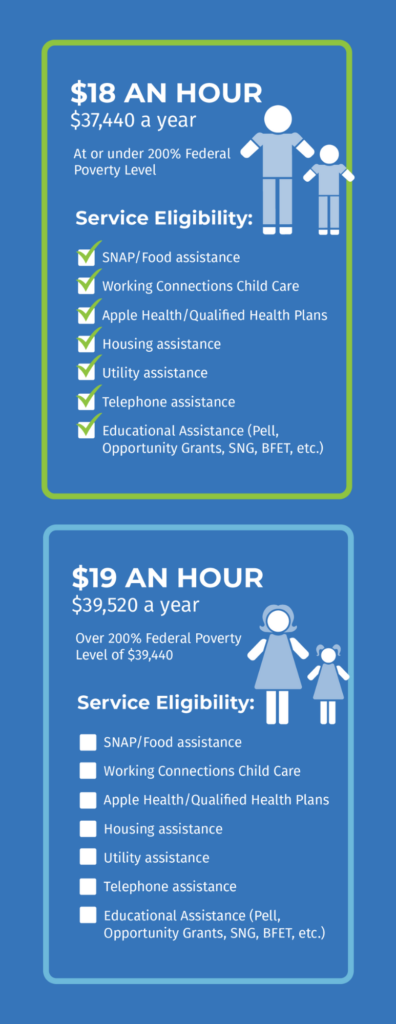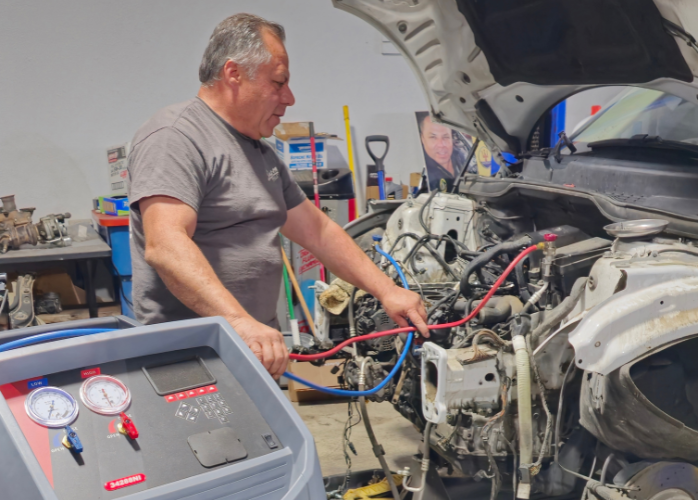
Advocacy
2025 Legislative Priorities
Economic Security for All (EcSA)
WWA’s top priority is to enhance Economic Security for All resources to increase service levels and simplify the program’s administration. EcSA provides a state funding stream that aligns existing workforce and support programs across the state to amplify their collective impact. These funds are a critical resource that addresses the need to connect businesses with workers and sustain the infrastructure for individuals to receive training and credentialing to be self-sufficient and achieve economic independence. EcSA funds primarily assist traditionally underserved communities, including BIPOC, justice-impacted, and rural populations, in creating generational economic success by providing individuals with the necessary resources and support to thrive in the workforce.
EcSA previously received $68.65 million biennially through $20.4 million in direct funds to the Employment Security Department (ESD) and a $48.25 million interagency agreement with ESD and the Department of Commerce (Commerce). Funding has been provided through multiple provisos, a mix of GF-S, CPP, and community reinvestment funds, with some funds being maintenance and some being one-time provisos.
Position:
- Maintain funding for EcSA, with ongoing appropriations to ESD of $20.7 million for core services adjusted for caseloads and inflation.
- Simplify ESD funding streams under a maintenance budget line item to support local boards’ business services to help people move out of poverty and into self-sufficiency.
- Continue the interagency agreement with ESD and Commerce to direct $48.25 million of Community Reinvestment funds to enhance EcSA’s pro-equity poverty reduction services.
Economic Security for All (EcSA)
Community Reinvestment Project
WWA supports continuing the Community Reinvestment Project (CRP), a vital initiative that addresses community empowerment, workforce needs, and justice-impacted individuals while promoting economic growth. Administered by the State Department of Commerce and in partnership with local workforce boards, it uses a community-driven approach to guide the development and delivery of impactful programs to address racial, economic, and social disparities and help individuals develop or enhance their skills to move to self-sufficient employment and long-term economic stability for themselves and their families.
Position:
Support the continuation of the Department of Commerce Community Reinvestment Project initiatives and partnership with local workforce boards, with ongoing funding to promote economic stability for families and thriving communities through the continuation of the following initiatives:
- Provide customers with resources to help meet basic needs as they actively pursue training toward their career goals.
- Support small businesses with grants, customized training programs, hiring needs, and other assistance to promote economic development.
- Offer financial coaching and Matched Savings Accounts to help customers purchase a home, invest in education or their business, or purchase other assets that support economic mobility and stability.

The Economic Security for All program operates with $68.65 million in funds from the Employment Security Department ($20.4 million) and the Department of Commerce Community Reinvestment Program ($48.25 million).
Economic Security for All Results
Economic Security for All (EcSA) is a state workforce development program focused on poverty prevention and reduction. It enhances and aligns existing programs and resources in local workforce systems across the state to move individuals from poverty, or at risk of falling into poverty, to self-sufficiency.
July 2023 through June 2024 (FY-2024):
- 3,050 job seekers served statewide by EcSA in FY 2024, compared to a goal of 1,306
- 5 months average duration
- $5,905 average per-person program cost to provide services
$49,296 median wage upon completion compared to below $10,000 at enrollment
88% of participants completing the program attain self-sufficiency
Focus on historically marginalized populations
- 51% BIPOC population participation
- 11% unhoused customer participation
For every $1.00 the state invests in EcSA the state gets a return of $2.34
$23,836,958.73 total estimated return generated by EcSA July 2023 – June 2024 from a $10.2 million investment
$2,436,422.73 total estimated increase in sales tax revenue generated by EcSA July 2023 – June 2024
$21,400,536 total estimated savings for the state generated by EcSA July 2023 – June 2024
The US Department of Labor has recognized EcSA as a best practice.
More information on EcSA can be found in ESD’s 2024 Legislative Report.

Community Reinvestment Program Outputs
The Community Reinvestment Program (CRP) is a statewide effort designed to strengthen the workforce and economic development across Washington, prioritizing Black, Latine, and Tribal communities. Local workforce boards are working to implement key
components of this plan, including direct financial support to participants, support to help businesses grow and thrive, and Matched Investment Savings Accounts (MISAs) that help individuals build financial security. These efforts are designed to create meaningful pathways to economic stability and self-sufficiency
for those most in need.
December 2023 through September 2024:
Overall
24% Increase in job seekers served
from Black, Latine, and Tribal communities, including 83% of all participants served in South Central Washington and 93% in Seattle-King County.
Career Accelerator Incentives
- Over 2,000 people across Washington served
- $7.3 million distributed statewide
Business Support
- 4,400+ businesses have been supported statewide with grants, technical assistance, and training opportunities
- Over 300 employees have received direct funding through grants and training, helping them grow their business
- $2.5 million has been invested directly into local businesses, giving them the tools to train employees, build resilience, and grow
Benefit Cliff
WWA recognizes the need to carefully manage benefit cliffs’ interaction with workforce development career pathways. Benefit cliffs refer to the sudden loss of public assistance, childcare, or housing when an individual’s income exceeds a certain threshold. While some benefit phaseouts are gradual, others are sudden and can significantly reduce income and resources for individuals and families, just as they are on the cusp of economic self-sufficiency. This is not only an issue for families but also for employers’ ability to attract and retain key talent for their workplace. When people cannot afford childcare or housing, they leave their jobs, turn down new career opportunities, and forgo pursuing additional education. Wrap-around services coordinated through local workforce boards allow income gains through higher-paying careers while balancing the loss of public assistance in the near term, mitigating the impact of benefit cliffs on low-income households.
Position:
- Support policies that prevent benefit cliffs for individuals transitioning to self-sufficiency.
- Protect and enhance incentives for wrap-around services, allowing individuals to meet career goals and increase earning capacity while reducing government dependence.
- Support policies to address the housing shortage, emphasizing those who earn too much to qualify for low-income housing but struggle to afford housing near their workplaces.
- Promote legislative investments and solutions that grow access to affordable childcare options, meet the needs of parents with infants and school-age-children, and invest in the people doing the vital work at childcare centers across our state.
- Encourage state agencies to analyze regulations and policies to ease the impact of benefit cliffs as individuals move from government benefits to self-sufficiency.

Economic Development
WWA believes that Local Workforce Development Boards are crucial to economic development and enhancement for today’s workforce and the future. They drive economic growth, job quality, and prosperity by fostering collaboration, strategic planning, and effective workforce programs. Local boards partner with employers, economic development councils, associate development organizations, and others to form a
frontline system to develop workforce plans and bridge gaps between employers, job seekers, and community organizations.
Position:
- Support strategies to increase outreach, capital, tools, and technical assistance to stimulate business, particularly in underserved and rural communities.
- Ensure job creation policies include locally led workforce development initiatives.
- Increase funding for regional capacity to coordinate and deliver economic development services through ongoing investments in Associate Development Organizations (ADOs).
- Ensure a solid foundation is in place to train, retrain, and upskill workers to meet the needs of the Clean Economy employers and projects.


Digital Equity
WWA is acutely aware of the pressing need to close the digital divide, particularly in rural and traditionally underserved communities. This is done by developing the trained workforce necessary to build broadband infrastructure, increasing broadband access, expanding digital literacy, and improving training for justice-impacted individuals and those preparing for release. Several initiatives are underway to achieve these goals. The Broadband Equity, Access, and Deployment (BEAD) program aims to close the digital divide by providing high-speed internet access to every person and business in the state by 2028. The Department of Commerce has developed a Digital Equity Plan to establish eligibility for federal funding to expand broadband access. The Washington Workforce Board previously received one-time, one-year funding for Digital Literacy and IT Career Equity to promote digital literacy and provide marginalized communities
pathways to high-demand, high-wage, information technology-based careers. Continued efforts are needed to ensure every resident has internet for education, training, job searches, running a business, or accessing necessities like healthcare and groceries.
Position:
- Support the Department of Commerce Digital Equity Plan to expand broadband access.
- Support the Washington State Broadband Office’s Broadband Equity Access and Deployment (BEAD) initiative and develop a comprehensive workforce development strategy that invests in skills and training for broadband deployment.
- Support the Workforce Board’s efforts to continue the digital literacy and equity in IT careers initiative through their 2025 funding request to increase digital literacy and access to technology-based careers and provide Skills Gap Program funds to fill critical skills gaps locally through partnerships between employers, the 12 Local Workforce Development Councils, and education organizations. Programs should be linked to existing resources whenever possible.

